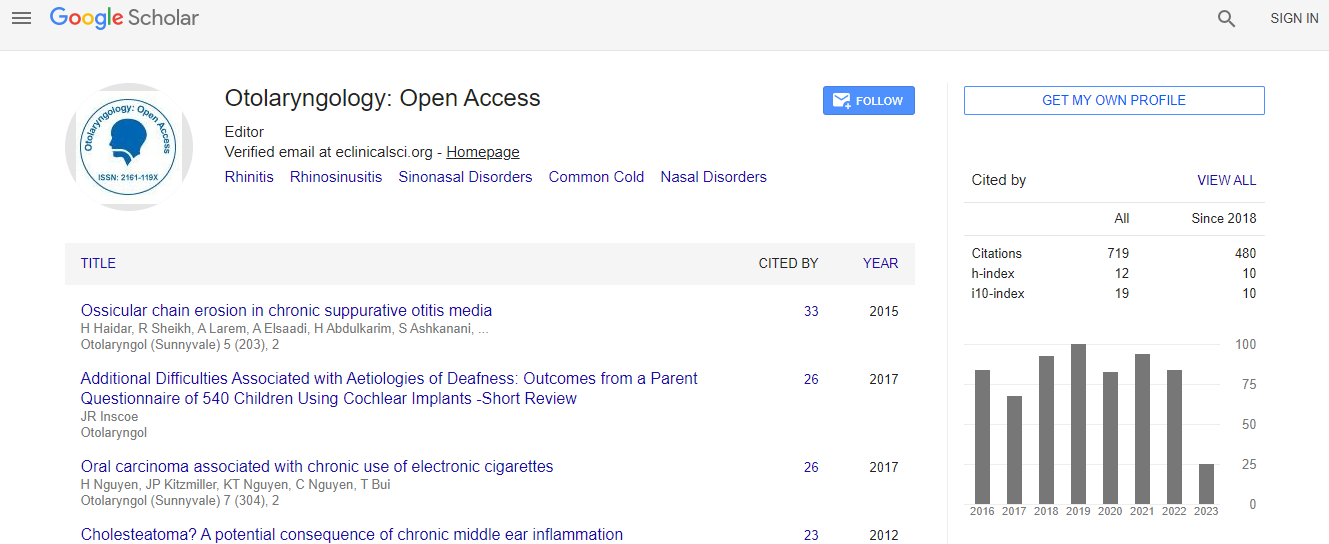Our Group organises 3000+ Global Conferenceseries Events every year across USA, Europe & Asia with support from 1000 more scientific Societies and Publishes 700+ Open Access Journals which contains over 50000 eminent personalities, reputed scientists as editorial board members.
Open Access Journals gaining more Readers and Citations
700 Journals and 15,000,000 Readers Each Journal is getting 25,000+ Readers
Google Scholar citation report
Citations : 925
Otolaryngology: Open Access received 925 citations as per Google Scholar report
Otolaryngology: Open Access peer review process verified at publons
Indexed In
- Index Copernicus
- Google Scholar
- Sherpa Romeo
- Open J Gate
- Genamics JournalSeek
- RefSeek
- Hamdard University
- EBSCO A-Z
- OCLC- WorldCat
- Publons
- Geneva Foundation for Medical Education and Research
- ICMJE
Useful Links
Recommended Journals
Related Subjects
Share This Page
Use of the harmonic scalpel for neck dissection: Systematic review and meta-analysis of randomized controlled trials
Global Summit and Medicare Expo on Head & Neck Surgery
Jack Woods
Royal College of Surgeons in Ireland, Ireland
Posters-Accepted Abstracts: Otolaryngol (Sunnyvale)
Abstract
Background: Neck dissection procedures carry significant risks and have high morbidity rates. The harmonic scalpel is a relatively novel surgical instrument and there is evidence from randomised controlled trials (RCTs) that it may improve outcomes when employed for dissection and haemostasis in these operations. Aim: A systematic review was performed according to PRISMA guidelines. RCTs were only included where the use of the harmonic scalpel was compared to conventional haemostasis in individuals undergoing neck dissection procedures for head and neck squamous cell carcinoma (HNSCC). Methodological quality was graded and data extracted by independent reviewers. Mean difference (MD) or odds ratio (OR) were calculated, with 95% confidence intervals (CIs). Analysis was conducted using a fixed effects or random effects model, depending on the associated statistical heterogeneity. Results: Four RCTs were included in the meta-analysis, comprising 284 procedures in total. There was a significant reduction in operative time (MD -30.04 minutes, 95% CI -48.77 to -11.31) and intra-operative blood loss (MD -58.34 ml, 95% CI -85.56 to -31.12) in the harmonic scalpel group. This was the case in both comprehensive and selective neck dissection procedures. Drain output showed a trend towards a decreased output in the harmonic scalpel group (MD -30.47 ml, 95% CI -67.06 to +6.11. There was no significant difference between hospital length of stay (MD -0.70 days, 95% CI -3.81 to +2.41) or complication rate (OR 0.64, 95% CI 0.25 to 1.64) between the harmonic scalpel and conventional haemostasis groups. Conclusion: Evidence from the available trials on the use of the harmonic scalpel for haemostasis in neck dissection for HNSCC suggests that it confers a significant benefit in comparison to conventional methods. The harmonic scalpel is an effective and safe instrument for use in neck dissection procedures.Biography
Email: jackwoods@rcsi.ie

 Spanish
Spanish  Chinese
Chinese  Russian
Russian  German
German  French
French  Japanese
Japanese  Portuguese
Portuguese  Hindi
Hindi 
